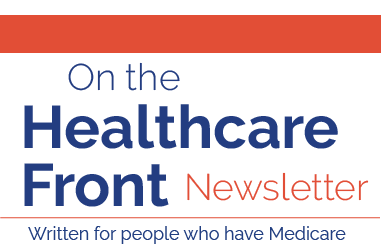
|
Issue #27 July 2024 Newsletter issues will tell you about Acentra Health’s free services for people who have Medicare. They also contain important information from Medicare and other health-related tips. Do you receive email reminders when new issues of On the Healthcare Front are published? |
when should you call acentra health?
- If you are not ready to be discharged from the hospital.
- If your Medicare skilled services are ending too soon. Examples of skilled services include things like physical therapy and nursing services.
- If you have a concern about the quality of care you received.
- If you have a concern about your medical care that needs to be taken care of right away.
Click on the link below for the phone number for your state. These services are free for people who have Medicare.
july is uv awareness month
Sun safety is all about protecting ourselves from the harmful effects of the sun's rays.
The sun can be both beneficial and dangerous. While it provides us with light and warmth, too much exposure can cause skin problems. Understanding the importance of sun safety helps us enjoy the outdoors without risking our health. By being mindful of how the sun affects us, we can take measures to keep our skin and overall well-being in good condition.
Read more:
www.acentraqio.com/uvawarenessmonth
do you have friends who might enjoy this newsletter?

We try to bring you healthcare-related tips each month like these and hope that you find them interesting and useful.
Pass along this link to your friends so they can read more about the newsletter — On the Healthcare Front — and how to sign up.
Here is the link you can copy and share with friends:
in this issue:
health observancelibraries and telehealth |
finding information onlineshare with friends |
kepro is now acentra health

As of July 1, 2024, Kepro is officially Acentra Health.
Providing the same services, but with a new name and look. There are no changes that will impact the free services you have come to expect from our company.
If you aren't familiar with our free services for people who have Medicare, you can read more on our Information for People with Medicare page.
libraries and telehealth: bringing health services closer to you

Imagine talking to a doctor or getting health advice without having to visit a doctor’s office. Now, think about doing this in a place as familiar and welcoming as your local library. This is exactly what's happening as libraries across the country are starting to offer telehealth services. This means you can use library resources (e.g., their computers and internet access) to talk with health professionals with the click of a mouse!
This article explains why this trend is growing, how it works, and what it could mean for you.
why libraries are offering telehealth
Libraries are trusted places in our communities where everyone can access a wide range of services for free. They are usually easy to reach and are seen as safe and fun places, making them ideal for hosting new services like telehealth. This service is especially important for people who live in rural areas or places where there aren't enough doctors or clinics. It's also helpful for people who might feel nervous about going to a doctor or who have difficulty traveling.
how telehealth works in libraries
Privacy is vital in health care, so you may understandably hesitate to go to a public location to talk to a doctor. However, you may rest assured that in many libraries, there are private rooms or areas set up with a computer, a webcam, and a secure internet connection.
Here’s how it could work:
- Booking a Session: Book your telehealth appointment through the library's website or with help from library staff.
- Meeting with Healthcare Providers: At the time of your appointment, go to the library and use their setup to talk to a healthcare provider through a video call. Many types of healthcare providers participate in telehealth, including (but not limited to) general doctors, specialists, or mental health professionals.
- Assistance with Technology: Trained library staff will help you set up the technology and make sure you know how to use it. They will also ensure that your privacy is protected during the session.
benefits of library-based telehealth
- Accessibility: This type of technology makes health care easier to access. You don't have to travel far, and you can use these services in a familiar, comfortable space.
- Convenience: Save some time without the hassle of traditional visits to a doctor’s office. No need for long waits or to take a whole day off for a doctor’s visit.
- Educational Resources: Libraries have lots of health-related books and resources. After your appointment, you can easily find more information about health conditions, treatments, and wellness.
- Reducing Stigma: For those uncomfortable or anxious about visiting health facilities, receiving care in a library may feel less intimidating.
looking ahead
Providing telehealth services in libraries is a promising step in making health care more inclusive and accessible. Creating a bridge between digital health services and the community, libraries are redefining their role in society. This initiative can help people get better access to health care and strengthen the community’s connection to their local library. In turn, libraries become cornerstones of health and education in neighborhoods.
Maybe this technology is available at your local library! Call your library and ask about telehealth services. If they don’t offer telehealth, consider sharing this link with your library to help them get started: Telehealth 101: What libraries need to know.
|
Read more: Article from the National Libraries of Medicine: Extending health care access via telemedicine in public libraries. Read about libraries in the state of Maine: Maine State Library Launches "Libraries Health Connect Program". |
how to find accurate information online: a simple guide

In today’s digital age, the internet is overflowing with information. However, not everything you read online is true or reliable. It's important to know how to sort through all the noise and find facts you can trust.
This article offers pointers to help you identify some trusted sources and tips to find information to help you make informed decisions, including decisions about your health.
Start with websites that are known for their integrity. These sites are usually reliable and provide facts that have been checked.
These include
- Government websites: These sites end with .gov and include the official website for Medicare, medicare.gov.
- Educational institutions: These sites include colleges and universities and end with .edu.
- Well-respected organizations: Websites ending with .org are primarily used for nonprofit organizations, such as charitable organizations, religious organizations, and community groups.
Consider a website’s design and web address (also referred to as a URL). Websites that look professional are more likely to contain reliable information. If a site is cluttered with ads or has a complicated layout, it might not be trustworthy. Finally, look at the website’s URL. Strange or overly complicated URLs can be a red flag for less credible sources.
Check the Author’s Credentials. Articles and information should be written by authors who are experts in their fields. An author’s background information, like their education, work experience, and their role in their industry, can usually be found in a short bio at the beginning or end of an article. Information from experts is more likely to be accurate and trustworthy.
Verify with Multiple Sources. Don’t rely on a single source of information. Instead, try to verify the facts by checking more than one place. If several trustworthy sites are reporting the same information, you can have more confidence in its accuracy.
Look at the Date. In fast-changing fields like technology, medicine, and science, information can quickly become outdated. As a result, you should always check the publication date of the information. Recent articles are more likely to provide the most current and relevant facts.
Beware of Bias. Every writer has a perspective. While important, regrettably, it can sometimes lead to biased information. Be aware of where the information is coming from and who is providing it. Some organizations or authors may present only one side of an argument. Try to read from a range of sources to get a balanced view.
Be Cautious with Social Media. Information on social media platforms can spread quickly and isn't always verified before it is shared. Double-check facts using credible sources before trusting or sharing news found on social media.
Finding accurate information online doesn’t have to be difficult. By using reliable sources, checking the author's background, verifying information through multiple channels, and being aware of bias, you can confidently navigate the vast amount of information available on the internet. Remember, taking an extra few minutes to verify something can save you from misinformation and help you stay well-informed.
Publication No. R146810-62-07/2024. This material was prepared by Acentra Health, a Medicare Quality Improvement Organization under contract with the Centers for Medicare & Medicaid Services (CMS), an agency of the U.S. Department of Health and Human Services. The contents presented do not necessarily reflect CMS policy.





